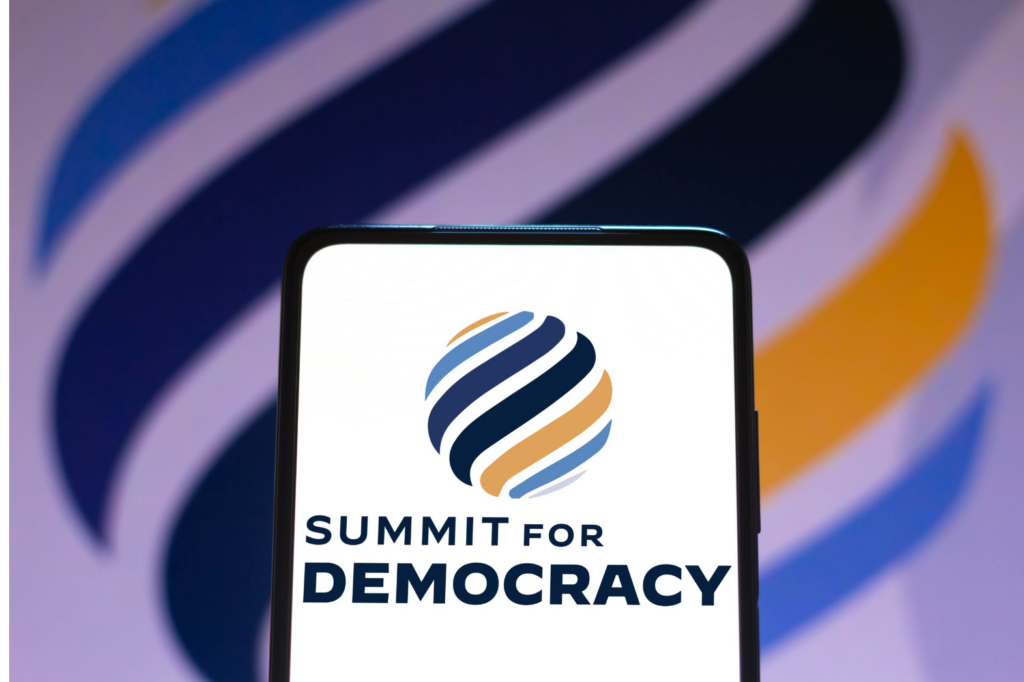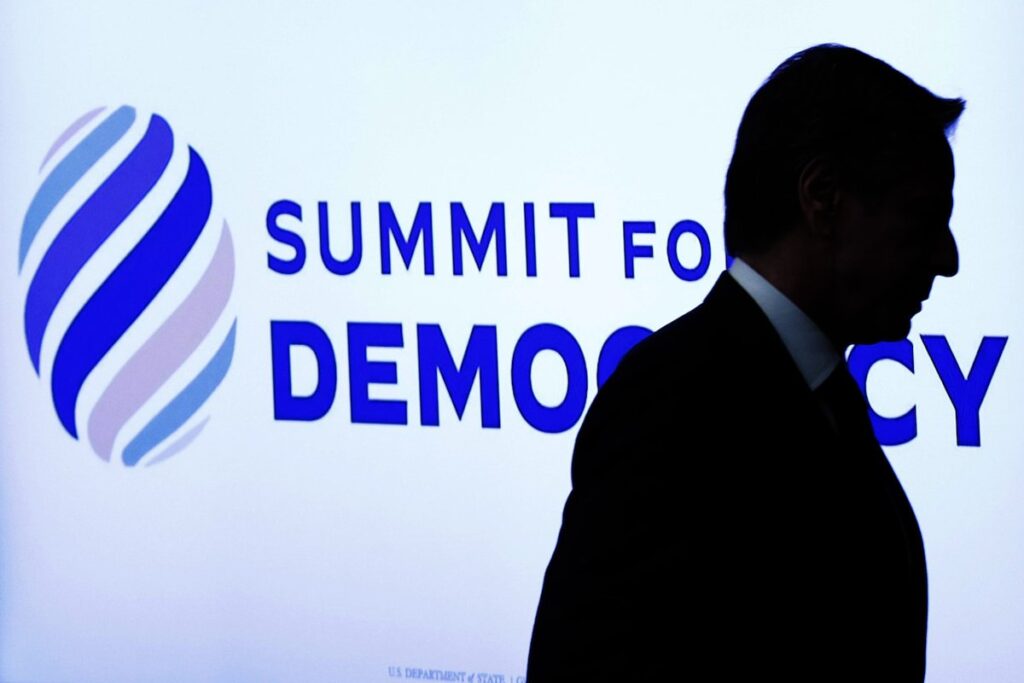President Joseph Biden used the occasion of this week’s Summit for Democracy to announce a plan to spend an additional $690 million on his Presidential Initiative for Democratic Renewal, an expansion of the government’s efforts to defend and grow democratic resilience globally.
How democratic were the countries at Biden’s democracy summit? While most nations in attendance were “free” societies, according to a recent report, dozens are struggling or backsliding. Other observers lament the absence of real teeth to Biden’s democracy-boosting rhetoric, The Post adds.
“I think the more important thing to do is to ask what are the commitments that are being made, how are countries following up and to what extent are countries committing to both domestic reforms as well as engagement in their foreign policy,” said Nicole Bibbins Sedaca, executive vice president of Freedom House, a nonprofit research group that monitors and advocates for democracy.
 “They can bolster democratic activists and strengthen civil society organizations, but they can’t impose costs on autocrats for malign behavior,” wrote Jon Temin of the Truman Center for National Policy. “As a result, the Biden administration’s approach to democracy support has plenty of programmatic carrots but few policy sticks. This isn’t a formula for success, since autocrats and reformers alike can see that Washington will commit resources to defend democracy but won’t use its leverage or expend political capital to do so.”
“They can bolster democratic activists and strengthen civil society organizations, but they can’t impose costs on autocrats for malign behavior,” wrote Jon Temin of the Truman Center for National Policy. “As a result, the Biden administration’s approach to democracy support has plenty of programmatic carrots but few policy sticks. This isn’t a formula for success, since autocrats and reformers alike can see that Washington will commit resources to defend democracy but won’t use its leverage or expend political capital to do so.”
Christopher Walker of the National Endowment for Democracy (NED) said that “authoritarian regimes around the world are a threat to democracy.” He mentioned specifically what has happened in China over last 10 years and asserted that China’s government is using technology such as TikTok to exploit its people and to increase its authoritarianism, FIU reports.
Venezuela is “a cruel, hollowed-out state” due to its backsliding away from democracy, he added.
A report released this month by Freedom House, a nonprofit group that monitors democracy, human rights and civil liberties around the world, found that global freedom had slipped for the 17th year in a row, by its measurement, The Times adds. But the group also reported that the steady decline might have plateaued and that there were just slightly more countries showing a decrease in freedoms compared with those whose records were improving.
“This seems like a critical moment,” said Yana Gorokhovskaia, an author of the Freedom House report. “The spread of decline is clearly slowing. It hasn’t stopped.”
 “It is high time those who believe in democracy come together with the same level of organization, enthusiasm, and support for one another to defend a liberal democratic order,” wrote Secure Democracy’s Laura L. Thornton.
“It is high time those who believe in democracy come together with the same level of organization, enthusiasm, and support for one another to defend a liberal democratic order,” wrote Secure Democracy’s Laura L. Thornton.
While the pros and cons of holding these summits are much debated, AXIOS adds. Biden’s broader claim about the global democratic trajectory isn’t unfounded. In its annual report on the state of global democracy, Freedom House described 2022 as a possible “turning point.”
“The idea of a robust marketplace of ideas, with freedom of speech and freedom of association, that is really crucial for real innovation,” says Suzanne Spaulding, director of the Defending Democratic Institutions project at CSIS. “China struggles to match our level of innovation.”
 The Presidential Initiative for Democratic Renewal (PIDR) comprises five lines of effort in response to significant challenges to democracy in the 21st Century. This includes the Partnerships for Democratic Development (PDD), which provides multi-year support to countries that demonstrate sustained democratic progress. The first wave of nine PDD partner countries comprises Armenia, Dominican Republic, Ecuador, Malawi, Nepal, North Macedonia, Paraguay, Timor-Leste, and Zambia, USAID adds:
The Presidential Initiative for Democratic Renewal (PIDR) comprises five lines of effort in response to significant challenges to democracy in the 21st Century. This includes the Partnerships for Democratic Development (PDD), which provides multi-year support to countries that demonstrate sustained democratic progress. The first wave of nine PDD partner countries comprises Armenia, Dominican Republic, Ecuador, Malawi, Nepal, North Macedonia, Paraguay, Timor-Leste, and Zambia, USAID adds:
Supporting Free and Independent Media
- The Media Viability Accelerator collaborates with Internews and six partner organizations, including the private sector, to preserve fact-based news and information media while ensuring that media outlets can survive, thrive, adapt, and grow as businesses. Recognizing the power of the private sector, USAID this week announced a new partnership with Internews and Microsoft, leveraging its technology to support fact-based, independent media.
- Reporters Shield helps to protect investigative journalists from defamation lawsuits by providing insurance liability coverage to cover the cost of defending journalists, civil society activists, and their organizations from defamation, libel, and other lawsuits meant to silence their reporting. It will begin accepting members in May 2023.
- USAID’s $20 million contribution to the International Fund for Public Interest Media (IFPIM) is helping to boost global support for media sustainability by providing grants to develop and sustain independent journalism…..
Fighting Corruption
- Through the Integrity for Development Campaign, USAID will seek to increase donor resources for anti-corruption, especially in environments where the international community is making major development investments, such as in climate finance….
- The Financial Transparency and Integrity (FTI) Accelerator will serve as the strategic umbrella for USAID to surge support for and ensure sustained progress on priorities identified by the Summit’s U.S. government-co-led FTI Democracy Cohort….
- The Countering Transnational Corruption Grand Challenge is harnessing the power of novel and proven technologies and partnering with the private sector, local solvers and influencers, and diverse networks to prevent corrupt actors from siphoning off resources intended for the public good….
- The Empowering Anti-Corruption Change Agents Program (EACCA) seeks to boost the work of anti-corruption change agents and investigative journalists around the world who seek to detect and expose corruption, and empower them with the tools and coalitions needed to strengthen their reform campaigns, advocate for and demand change, operate in safety, and engage in collective and collaborative actions. …
- The Global Accountability Program (GAP) aims to curb transnational corruption, grand corruption, and kleptocracy by strengthening countries’ defenses against illicit finance, money laundering, and other criminal flows and accelerating international cooperation.
- The Anti-Corruption Response Fund (ACRF) addresses emerging and dynamic opportunities within countries to counter corruption, responds to heightened corruption risks and challenges, and pilots new approaches to countering transnational corruption and implementing the USAID Anti-Corruption Policy….
Bolstering Democratic Reformers and Human Rights
- USAID will advance People-Centered Justice, an evidence-based, innovative approach designed to help justice institutions, first and foremost, meet the day-to-day justice needs of the people they serve, as the cornerstone of its soon to be released first-ever Rule of Law Policy. …
- USAID is working with bilateral and multilateral partners, philanthropic foundations, and civil society actors to develop International Principles for Supporting Peaceful Collective Action, as part of the agency’s commitment to support activism and social movements….
- USAID will expand protections for defenders of democracy and human rights through improved duty of care and strengthen social safeguards, including by establishing a new accountability mechanism, a Beneficiaries’ Bill of Rights, and additional social safeguard capabilities to effectively conduct social impact analysis and guide social risk management and mitigation.
- Powered by the People (PxP) provides direct and accessible financial assistance, including legal and psychosocial support, to address the needs, opportunities, and challenges identified by activists and other civic actors engaged in collective action and peaceful movements….
- Advancing Women’s and Girls’ Civic and Political Leadership adopts an ecosystem approach to improve women’s civic and political engagement. …. USAID has identified eight initial focus countries: Côte d’Ivoire, Nigeria, Tanzania, Colombia, Ecuador, Honduras, Kyrgyz Republic, and Yemen.
- The Multilateral Partnership for Organizing, Worker Empowerment, and Rights (M-POWER) is helping improve worker rights and empowerment by bringing together governments, unions, labor academics, and civil society organizations to strengthen workplace democracy globally. ….
Advancing Technology for Democracy
- USAID will work with international partners to develop a set of Donor Principles for the Digital Age as adopted safeguards to help ensure that donor-supported programs do not inadvertently facilitate the weaponization of or harm caused by data driven technologies and information.
- Advancing Digital Democracy (ADD) is working to foster open, secure, inclusive, and rights-respecting digital democracies. …ADD activities are being expanded to six additional USAID partner countries this year. USAID is working with local governments, civil society, academia, and the private sector to support multistakeholder engagement in this initiative.
- The Promoting Information Integrity and Resilience (Pro-Info) Initiative will build on the work of the Summit’s Information Integrity Cohort and USAID and U.S. Department of State’s new and existing efforts to strengthen information integrity and resilience globally in the countries we operate in overseas.
Defending Free and Fair Elections and Political Processes
- USAID will enhance its support for democratic elections globally by developing guidelines for USAID Electoral Assistance for the 21st Century, which adheres to U.S. government values and draws from global electoral assistance principles and best practices…
- The Global Network for Securing Electoral Integrity (GNSEI) is rallying the international electoral integrity community to create a platform for advancing electoral integrity norms and guidelines. …..
- The Defending Democratic Elections (DDE) Fund pilots and scales solutions to enhance electoral integrity – particularly those posing a threat during the period in between elections. ….







